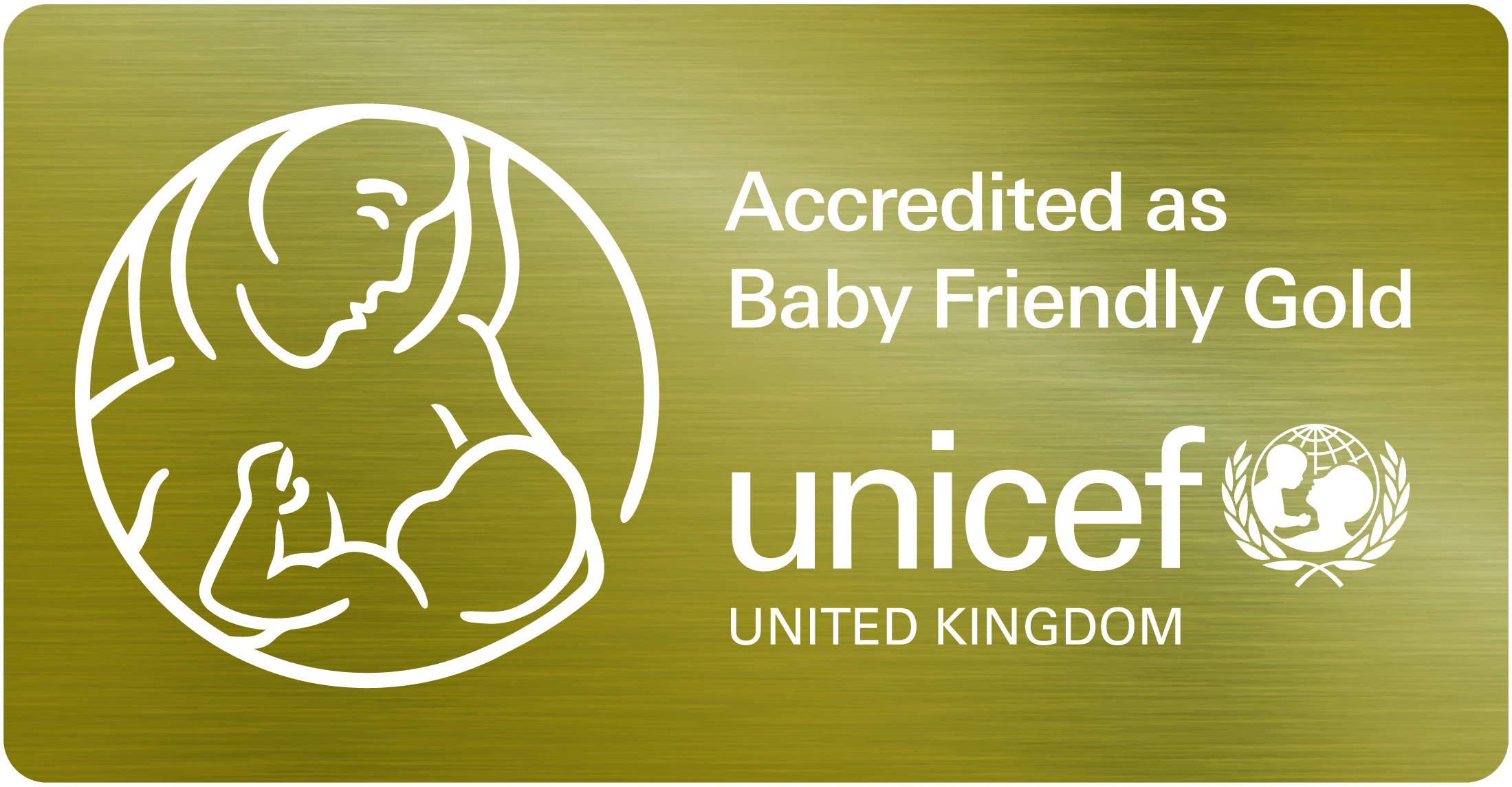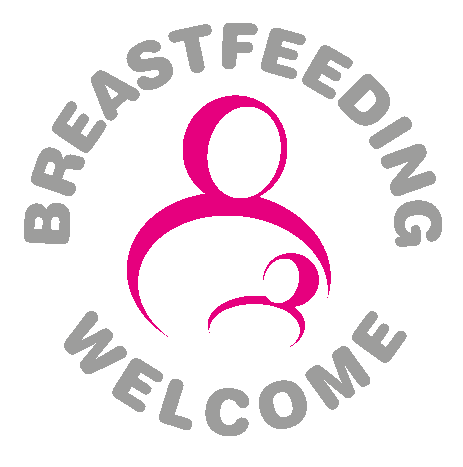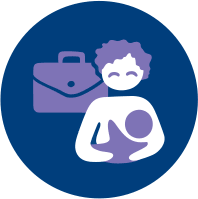UNICEF UK Baby Friendly Initiative (BFI) GOLD reaccreditation 2024

Click the icon above for more information on our UNICEF UK Baby Friendly Initiative (BFI) GOLD Reaccreditation.
Need help with feeding?
Community Midwives:
Blackburn with Darwen and Hyndburn and Ribble Valley: 01254 733434
Burnley, Pendle and Rossendale: 01282 803434
Health Visiting teams:
East Lancashire: 0300 247 0040
Blackburn with Darwen: 01254 585000
National Breastfeeding Helpline (open 24/7 including bank holidays):
0300 100 0212 - includes English, Polish and Welsh translations
0300 456 2421 - Bengali and Sylheti
National Childbirth Trust (NCT):
National Childbirth Trust (NCT) - Lancashire residents only (NOT Blackburn with Darwen)
NCT Lancs phone number: 02087529025
NCT National helpline: 0300 330 0700 (8am-12pm 7 days a week and manned by breastfeeding councillors)
Breastfeeding groups/support options
Visiting a breastfeeding group both in your pregnancy and after your baby is born can be a great way to share experiences and support with other breastfeeding families.
A chance to meet new friends and receive feeding support from trained professionals if needed.
No appointment necessary - just drop in.
Monday
1:00pm – 2:00pm
Wensley Fold Children’s Centre BB2 6NL (01254) 585085
Tuesday
1:00pm – 2:00pm
Livesey Family Hub BB2 4NU (01254) 507950
Wednesday
1:00pm – 2:00pm
Shadsworth Family Hub BB1 2HR (01254) 585209
Thursday
12:30pm – 1:30pm
Little Harwood Family Hub BB1 5PE (01254) 506910
*Sling library first Thursday of each month 12:30pm – 2:00pm
Friday
10:00am – 11:00am
Darwen Family Hub BB3 0HD (01254) 778900
Click here to download the BwD Breastfeeding Groups flyer.
(Please note this PDF download is not in an accessible format)
West Pennine Slings
Find out about babywearing and try out different baby carriers.
Why use the sling library?
- Discover all you need to know about carriers and slings before and after birth
- Try out and borrow carriers - free hires for all BwD residents
- Babywearing has many benefits for baby and you
- Carriers can be used from newborn to around four years old
Join us at one of our playgroups or walks
Playgroups
- Every Wednesday 10am-11.30am at Darwen Valley Community Centre
- First Thursday of the month 12.30pm-2pm at LIttle Harwood Children's Centre
Walks
- Every Monday 10am-11.30am at a different venue each month - get in touch for more details
Mobile: 07900987789
Email: info@wpslings.com
What is Anya?
Anya is an app providing expectant and new parents with 24/7 evidence-based support.
Who can get the app? How does it work?
Any resident of Blackburn with Darwen and East Lancashire is eligible for a premium licence for the duration of Pregnancy +4 months postnatally.
When they download the app and enter their postcode, they will automatically receive a FREE Premium upgrade – simple!
What support can parents get in the app?
The Anya app supports parents on a range of topics through the first 1001 days, with an AI virtual companion,
1-2-1 human specialist support, 3D animations, articles and webinars and much more!
Sounds great – when will it be available?
The app will launch to parents in the New Year, but Health Professionals can download now to explore the app and the support available!
Scan the QR code and take a look for yourself. If you don’t have a BwD postcode you can click this link (after downloading) to get your Premium access.
For more information on NCT across Lancashire, visit their website.
Antenatal
Your Health Visitor will contact you between 30-40 weeks and arrange a home visit. This is a great opportunity to explore your feelings around your pregnancy and caring for your baby when he or she is born.
Your Antenatal Education Package
All families: Clink the link for Preparing for birth and parenthood - virtual resources
East Lancashire families: Click the link to see the available virtual and face to face groups
5 ways you can protect your baby
Antenatal hand expressing of colostrum
Leaflets and videos
Jaundice is the name given to the yellow appearance of the skin and the whites of the eyes.
Jaundice is very common in newborn babies. About 60% of full-term babies and 80% of premature babies develop jaundice in the first week of life. Jaundice reaches its peak at about four days of life and then gradually disappears in most babies by the time they are two weeks old. Some babies may need more help to feed effectively and may need treatment for their jaundice. Jaundice does not necessarily mean your baby is ill.
Jaundice can occur within the first 24 hours after birth, but this is rare. If this happens it is important that a Neonatal Doctor sees your baby. Normally this will not be a problem as you will still be in hospital.
If your baby is at home, it is important you tell your midwife or doctor.
Please ensure that your baby is feeding effectively:
A sleepy baby should be woken for feeds as this will help reduce the jaundice and prevent excessive weight loss. New babies should have a minimum of 8 feeds every 24 hours. Please always discuss with your midwife if your baby is sleepy so that the midwife can assess your baby overall and assess feeding. Your midwife will then help put a plan in place. This should not be delayed.
This leaflet will help you to:
- Understand what jaundice is and what causes it
- Why treatment is important for some babies
- Understand normal wet and dirty nappies / colours
For further information please see:
This is the NCT information.
This is the NHS information.
Click here to view Professor Amy Brown's videos for new parents.
For UNICEF leaflets and videos on Skin to Skin, Parent information, Infant Feeding and overcoming challenges, hand expressing your breast milk, breastfeeding in public please and much more, please follow this link.
Breastfeeding
|
Breastfeeding at
|
Prepare for Breastfeeding (audio clip)
This FREE audio clip gives you some useful tips on infant feeding such as attaching your baby onto your breast, close loving relationships and skin to skin. This download will sit alongside all the conversations you will have during your pregnancy with your midwife. The download enables you to settle back, relax within the comfort of your own home and enjoy being with your baby, feeling your baby move, interacting with your baby. Relaxation helps release endorphins, these are our feel good hormones. Pregnancy is about building a relationship with your baby.
Feeding
There are a range of useful documents and videos below:
Breastfeeding while out and about
The Equality Act 2010 says that it is discrimination to treat a woman unfavourably because she is breastfeeding. It applies to anyone providing services, benefits, facilities and premises to the public, public bodies, further and higher education bodies and association. Service providers include most organisations that deal directly with the public. Service providers must not discriminate, harass or victimise a woman because she is breastfeeding.
Discrimination includes refusing to provide a service, providing a lower standard of service or providing a service on different terms. Therefore, a cafe owner cannot ask you to stop breastfeeding, ask you to move or cover up or refuse to serve you.
You can find out more about your rights, here.
Support for families expecting twins or more
Breastfeeding Multiples
See the links below for guidance:
bestbeginnings.org.uk/fbtb-twins-or-more
abm.me.uk/breastfeeding-information/breastfeeding-twins/
https://www.healthierlsc.co.uk/BetterBirths/Families/preparing-birth-and-parenthood
Support for families on the Neonatal Intensive Care Unit (NICU)
See the link below to the NICU web page for more information on Baby-friendly care, expressing breast milk and feeding your baby on the Neonatal Unit:
Parent-Infant Relationships
Information for parents who are formula feeding
Please see from page 37 in this document for information about formula preparation machines.
Hot weather, infant feeding and water
Fully breastfed babies do not need water until they are on solid foods. Your baby will need to breastfeed more than usual as they need extra drinks and breastfeeding parents should keep hydrated for their own wellbeing.
Click here for a poster.
Click here for guidance and recommendations on giving water to your baby.
Click here for FAQs on the recommendations for giving water during infancy.
Moving onto solid foods
Parents need evidence-based, independent information on complementary feeding.
“Eating well: the first year. A guide to introducing solids and eating well up to baby's first birthday” which can be downloaded and printed for free is also a fantastic resource for parents.
Weaning | Start 4 Life (www.nhs.uk)
New campaign promotes advice to introduce babies to solid food - GOV.UK (www.gov.uk)
https://www.firststepsnutrition.org/
Resources in other languages
The UNICEF Baby Friendly Initiative has published Breastfeeding and Bottle feeding written resources in Arabic, Bengali, Hindi, Lithuanian, Mandarin, Polish, Romanian, Slovak, Turkish, Urdu and Ukranian. To access these, click here.
Useful documents
Below are a list of useful websites for general information and breastfeeding support. Simply search the below on your internet browser:
- Lancashire and South Cumbria Better Births - support with preparing for parenthood and after bith
- HRCG - Feeding your baby postnatally
- Breastfeeding Network (BfN) - providing drugs in breast milk fact sheets
- Twins Trust
- First Steps Nutrition - information about formula milks
- Tongue Tie Association





